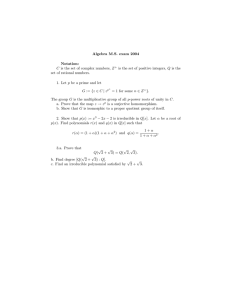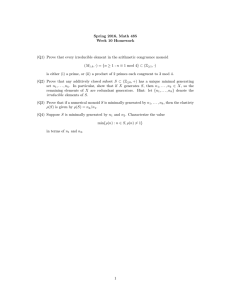Solutions
advertisement
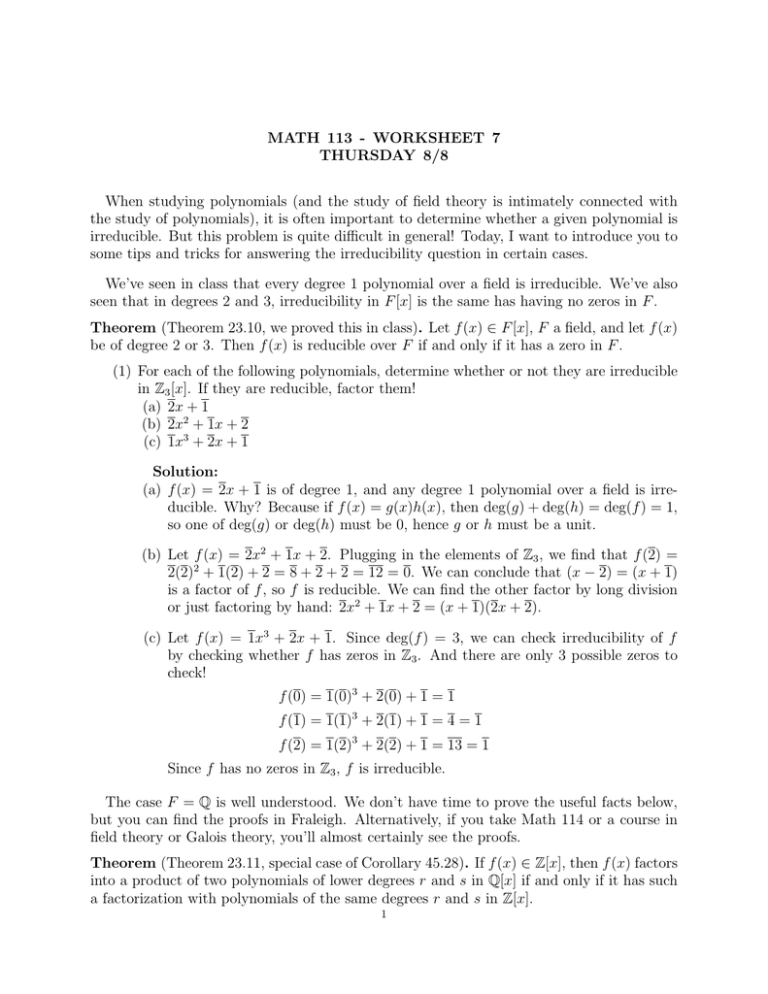
MATH 113 - WORKSHEET 7 THURSDAY 8/8 When studying polynomials (and the study of field theory is intimately connected with the study of polynomials), it is often important to determine whether a given polynomial is irreducible. But this problem is quite difficult in general! Today, I want to introduce you to some tips and tricks for answering the irreducibility question in certain cases. We’ve seen in class that every degree 1 polynomial over a field is irreducible. We’ve also seen that in degrees 2 and 3, irreducibility in F [x] is the same has having no zeros in F . Theorem (Theorem 23.10, we proved this in class). Let f (x) ∈ F [x], F a field, and let f (x) be of degree 2 or 3. Then f (x) is reducible over F if and only if it has a zero in F . (1) For each of the following polynomials, determine whether or not they are irreducible in Z3 [x]. If they are reducible, factor them! (a) 2x + 1 (b) 2x2 + 1x + 2 (c) 1x3 + 2x + 1 Solution: (a) f (x) = 2x + 1 is of degree 1, and any degree 1 polynomial over a field is irreducible. Why? Because if f (x) = g(x)h(x), then deg(g) + deg(h) = deg(f ) = 1, so one of deg(g) or deg(h) must be 0, hence g or h must be a unit. (b) Let f (x) = 2x2 + 1x + 2. Plugging in the elements of Z3 , we find that f (2) = 2(2)2 + 1(2) + 2 = 8 + 2 + 2 = 12 = 0. We can conclude that (x − 2) = (x + 1) is a factor of f , so f is reducible. We can find the other factor by long division or just factoring by hand: 2x2 + 1x + 2 = (x + 1)(2x + 2). (c) Let f (x) = 1x3 + 2x + 1. Since deg(f ) = 3, we can check irreducibility of f by checking whether f has zeros in Z3 . And there are only 3 possible zeros to check! f (0) = 1(0)3 + 2(0) + 1 = 1 f (1) = 1(1)3 + 2(1) + 1 = 4 = 1 f (2) = 1(2)3 + 2(2) + 1 = 13 = 1 Since f has no zeros in Z3 , f is irreducible. The case F = Q is well understood. We don’t have time to prove the useful facts below, but you can find the proofs in Fraleigh. Alternatively, if you take Math 114 or a course in field theory or Galois theory, you’ll almost certainly see the proofs. Theorem (Theorem 23.11, special case of Corollary 45.28). If f (x) ∈ Z[x], then f (x) factors into a product of two polynomials of lower degrees r and s in Q[x] if and only if it has such a factorization with polynomials of the same degrees r and s in Z[x]. 1 So if you want to determine whether a polynomial is irreducible in Q[x], it suffices to check whether it can be factored in Z[x]. The next theorem is an easy consequence of this fact. Theorem (Rational Roots Test, a version of Corollary 23.12). If f (x) = an xn + · · · + a0 is in Z[x] with a0 6= 0, and if f (x) has a zero nd ∈ Q (written in lowest terms), then n | a0 and d | an in Z. (2) Show that x2 + 8x + 2 and x3 + x − 6 are irreducible in Q[x]. Solution: Both of these polynomials are of degree 2 or 3, so to show they are irreducible, it suffices to show they have no roots in Q. For f (x) = x2 + 8x + 2, by the Rational Roots Test, if nd ∈ Q is a zero written in lowest terms, then n | 2 and d | 1. So n = ±1, ±2, d = ±1, and the only options for zeros are 1, −1, 2, −2. We can just check these, but to save time, note that if x > 0, then f (x) > 0, so we can rule out 1 and 2. And: f (−1) = (−1)2 + 8(−1) + 2 = −5 f (−2) = (−2)2 + 8(−2) + 2 = −10. For f (x) = x3 + x − 6, by the Rational Roots Test, if nd ∈ Q is a zero written in lowest terms, then n | −6 and d | 1. So n = ±1, ±2, ±3, ±6, d = ±1, and the only options for zeros are 1, −1, 2, −2, 3, −3, 6, −6. Again, there’s only finitely many things to check, but we can observe that if x < 0, then f (x) < 0, so we can rule out the negative options. And: f (1) = (1)3 + 1 − 6 = −4 f (2) = (2)3 + 2 − 6 = 4 f (3) = (3)3 + 3 − 6 = 24 f (4) = (4)3 + 4 − 6 = 66. (3) Show that x4 − x + 1 is irreducible in Q[x]. (First establish that it has no roots in Q. Then conclude that if it were reducible, then it could be factored in the form (ax2 + bx + c)(a0 x2 + b0 x + c) with all coefficients in Z, and derive a contradiction.) Solution: Let f (x) = x4 − x + 1. First I claim that f has no zeros in Q. If it did, writing a zero as nd in lowest terms, by the rational roots test we have n | 1 and d | 1, so the only possibilities are 1 and −1. But f (1) = (1)4 − 1 + 1 = 1 f (−1) = (−1)4 − (−1) + 1 = 3. Now suppose for contradiciton that f is reducible, so f (x) = g(x)h(x) with g and h nonunits. Neither g nor h are linear, since if they were, then f would have a zero in Q. But deg(g) + deg(h) = deg(f ) = 4, so the only option is deg(g) = deg(h) = 2. Also, by the theorem above, if f factors into two quadratics in Q[x], then f also factors into two quadratics in Z[x]. So we can write f (x) = (ax2 +bx+c)(a0 x2 +b0 x+c0 ), with a, b, c, a0 , b0 , c0 ∈ Z. Then x4 − x + 1 = aa0 x4 + (ab0 + ba0 )x3 + (ac0 + bb0 + ca0 )x2 + (bc0 + cb0 )x + cc0 . Equating coefficient of common powers, we have aa0 = 1 and cc0 = 1, so a = a0 = ±1 and c = c0 = ±1. Also ab0 + ba0 = 0, so cancelling an a = a0 from both sizes, b0 + b = 0, i.e. b0 = −b. Then bc0 + cb0 = −1, so substituting c0 for c and −b for b0 , bc + c(−b) = −1. But the left side is 0, so this is a contradiction. Finally, there’s Eisenstein’s Criterion. It rarely applies, but when it does, it gives a quick and easy answer. Theorem (Eisenstein’s Criterion, Theorem 23.15). Let p ∈ Z be a prime. Suppose that f (x) = an xn + · · · + a0 is in Z[x] and an 6≡ 0 (mod p), but ai ≡ 0 (mod p) for all i < n, with a0 6≡ 0 (mod p2 ). Then f (x) is irreducible in Q[x]. (4) Do the following polynomials satisfy Eisenstein’s Criterion for irreducibility? Explain. (a) x7 + 4x6 − 18x5 + 42x2 − 6 (b) 2x5 + 18x3 + 3x (c) x4 + 9 (d) 5x4 + 7x + 35 Solution: (a) Yes. Take p = 2. 1 6≡ 0 (mod 2) 4 ≡ 0 (mod 2) −18 ≡ 0 (mod 2) 42 ≡ 0 (mod 2) −6 ≡ 0 (mod 2) −6 6≡ 0 (mod 22 ) (b) No. The constant term a0 is 0, so for any prime p, we’ll have a0 ≡ 0 (mod p2 ). (c) No. The only possible choice of p such that 9 ≡ 0 (mod p) is p = 3, but then 9 ≡ 0 (mod 32 ). (d) Yes. Take p = 7. 5 6≡ 0 (mod 7) 7 ≡ 0 (mod 7) 35 ≡ 0 (mod 7) 35 6≡ 0 (mod 72 )
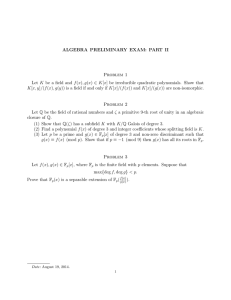
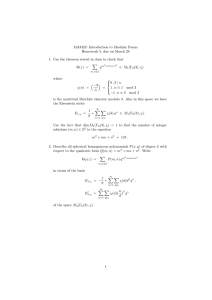
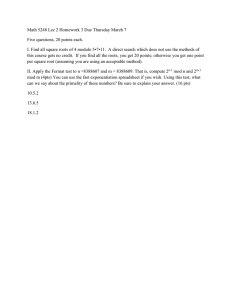
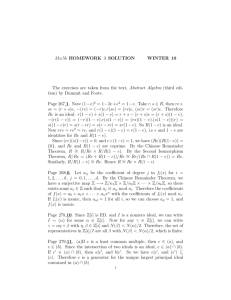
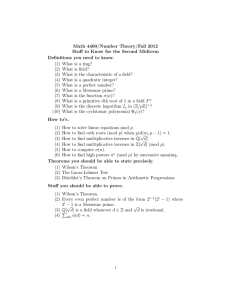
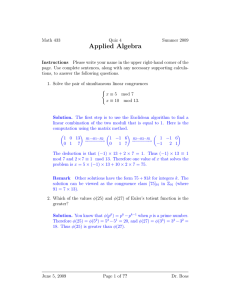
![is a polynomial of degree n > 0 in C[x].](http://s3.studylib.net/store/data/005885464_1-afb5a233d683974016ad4b633f0cabfc-300x300.png)
